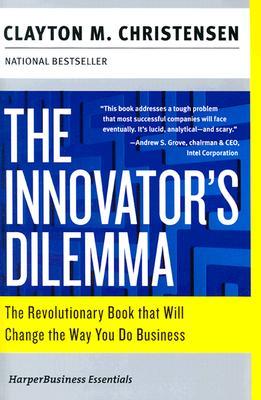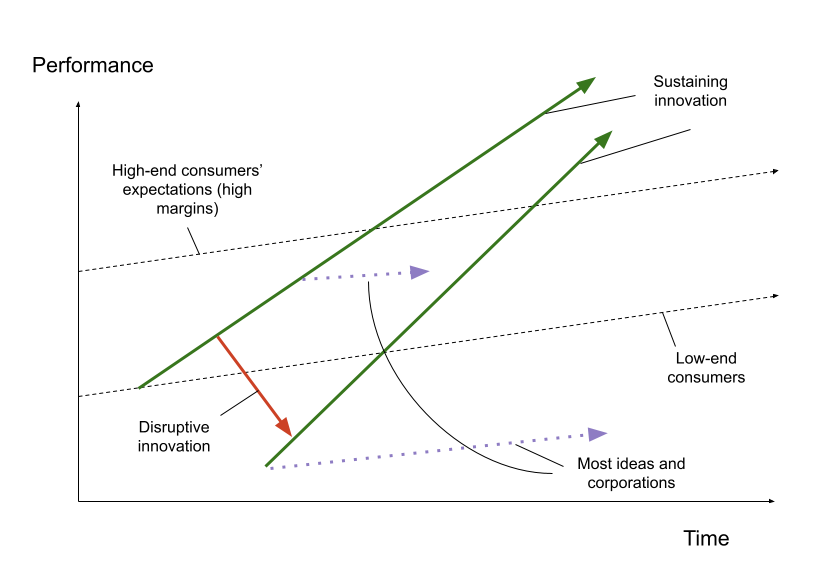
Unlike humans with 80 years of life expectancy, corporations have a broad spectrum of patterns. For example, the international banking group of Citi existed for over 200 years, but Facebook isn’t even 15 years old when they are already one of the most expensive corporations in the world. Moreover, as the market changes even more rapidly, the average age of the S&P 500 is less than 20 now1, while it was 60 in 1950. Powerful companies can quickly fade away, and entities like Yahoo! or Lehman Brothers don’t exist independently now.
The author observed that winning companies deteriorate when management does a great job: listening to customer demands, investing in appropriate technology to satisfy the needs, and creating better products. In other words, to sustain competency, you need to occasionally ignore customer demands, invest in unreasonable technology, and create irrelevant products. To understand this paradox, we need to distinguish different types of innovations:
- Sustaining innovation: incrementally improving existing products for better performance or lower prices.
- Disruptive innovation: unheard-of products or processes that may seem odd and irrelevant.

It is challenging for sound management of incremental innovations to make disruptive innovations. The overall dynamics of employees, executives, and shareholders cannot invest in weird products with doubtful profitability. It is similarly challenging for different teams to compete with a successful product in the same company. In short, all the advantages of a streamlined organization don’t go well with disruptive innovations. For example, while focused executions are critical for sustaining innovations, market explorations can be more important for disruptive innovations. Due to those inherent challenges, some corporations operate separate entities for disruptive innovations. Acquisition can be a good strategy too, and Facebook’s acquisition of Instagram is a great example. Note that lots of people doubted this deal at the time. This story clearly shows the importance of the CEO’s long-term insights.
If you don’t cannibalize yourself, someone else will. – Steve Jobs
The insights about different types of innovations are also valuable for individuals and countries. For example, you can re-evaluate if your software engineer career should develop with the incremental addition of an existing framework (e.g., backend vs. frontend stack). It is also worth noting that sustaining innovation is still very important and isn’t easy, especially in the rapidly changing innovation sector. Therefore, you need to understand where your organization fits and align your contributions to the common goal. Even for disruptive innovation, each contribution typically goes toward incremental improvements of the large team impact. As the above diagram shows, however, disruptive innovation may take much longer to see tangible outcomes in the market.
Spend 80 percent of your time on 80 percent of your revenue. – Bill Gates
Countries should welcome diverse types of innovations for their competencies. If a country relies too heavily on one type, its competency can grow outdated in the broader market. For example, after disruptive innovations like Toyota and Sony, Japan has relied too heavily on sustaining innovations for the last 30 years and seems less competitive now. In the same period, China showed significant efficiencies with the one-party system, but it is also unclear if it can show necessary diverse innovation for future leadership. The U.S. feels much more chaotic, but maybe that’s how it keeps leadership with various innovations. I think it can be beneficial for Korea to welcome diverse innovations too, but of course, not 100% certain. For example, Korea has uncommon policies to reject disruptions like Uber, but maybe such isolation is the recipe for Korean competencies like K-pop.
This classic book has been widely recognized for the last 20 years. Even though it is hard to overcome the innovator’s dilemma, many are developing solutions. The key lesson is to keep executing short-term innovations while preparing for the long-term future with wide open minds. As always, it is easy to be said than done. ∎
More books to recommend:
- Is Tesla disruptive? – Benedict Evans
- Zero to one – Peter Thiel
- The lean startup – Eric Ries
- High Output Management – Andrew Grove
- Talks at Google by the author